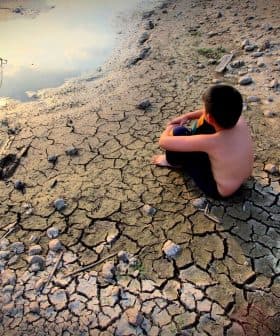Studies Show Progress in Changing the Minds of Climate Skeptics
Reminding climate skeptics that they believe in basic scientific principles might prompt them to accept that climate change is real, a new study from the American Psychological Association suggests.
 APA headquarters. Photo courtesy of Oak Street Studios.
APA headquarters. Photo courtesy of Oak Street Studios.Two studies presented at the American Psychological Association convention suggest that reminding people of their belief in gravity and training educators to persevere in discussions about climate change can shift views on the topic and prompt more public debate. Researchers found that conservatives were more likely to believe in climate science when asked general science questions first, leading to more credibility for the topic among skeptics.
Reminding people that they believe in gravity and training educators to persevere in spite of climate skeptics may shift views on climate science and prompt more public discussion of the critical topic, according to two studies presented at the annual convention of the American Psychological Association.
The first study, which takes advantage of humans’ desire for internal consistency, found that conservatives are more likely to believe in climate science when they first answer questions about general science topics, such as gravity and medicine.
For conservatives who are climate skeptics, it becomes awkward to report on our survey that yes, they believe in science but somehow – despite using the same scientific method – climate science is invalid.
Researchers surveyed nearly 700 participants in the United States and asked each about their political leanings and beliefs in climate change. Half the participants were asked only about climate science, while the other half were first asked about general topics.
As expected, conservatives were more likely to deny the existence of climate change than liberals. However, conservatives who answered questions about climate change only said they found the topic “a little credible,” while those who first answered questions about non-controversial science topics said they found climate change “somewhat credible.”
See Also:Climate Change NewsThe strategy could lead to gains in support for climate action in the future, said Carly D. Robinson of Harvard University, who presented the research at APA’s annual convention in August.
“For conservatives who are climate skeptics, it becomes awkward to report on our survey that yes, they believe in science but somehow — despite using the same scientific method — climate science is invalid,” said Robinson, who was part of a team that conducted the research. “We designed an intervention to help remind participants that they do believe in science.”
The second study explored which type of training could foster more climate discussions between science educators and the public. It included 203 educators from zoos, aquariums and national parks, many of whom said they find it uncomfortable to discuss climate change with visitors.
That is not surprising given a 2018 Yale University study that shows 28 percent of Americans think global warming is a natural phenomenon. Meanwhile, 97 percent of climate scientists agree that climate change is real, urgent and human-caused.
The training study found that by igniting a sense of resilience and perseverance in workers, they were more likely to discuss the critical topic with the public, even when faced with potential pushback from climate skeptics.
A second method designed to instill determination and enthusiasm in workers was less effective in promoting discussion.
“There are several important implications of these findings,” said Nathaniel Geiger, an assistant professor of environmental communication at Indiana University, who presented the research. “For one, this work, together with our other published work on communicating about climate change, speaks to the importance of developing empirically tested methods of improving conversations about difficult topics.”
The educators were part of a yearlong communication training program from the National Network of Ocean and Climate Change Interpretation. It was designed to build participants’ confidence in talking about climate change.
Educators reported a spike in climate communication after the program, from less than once monthly prior to the training to more than two or three times per month afterward, Geiger said.









